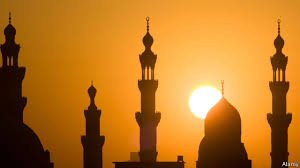(JUMAT SERMON) Islam: The Simple Religion (Part 1)


By Imam Musa Oladapo Raji
ALL praise is due to Allah, the Lord of the universe, the Sustainer and Cherisher of our lives, he whom Allah guides he is rightly guided, but he whom He sends astray, for him he would find no one guiding friend (waliyy) to lead him (to the right part). I testify that there is no deity worthy of worship except Him and I also testify that Prophet Muhammad is His Servant and His Messenger. May the peace and mercy of Allah be upon His soul, member of His household, His companions and those who follow him till the day of accountability.
In the name of Allah, Most Gracious, Most Merciful. And strive hard in Allah’s cause as you ought to strive with sincerity and with your efforts that His Name should be superior. He has chosen you to convey His Message of Islam. And has not laid upon you in religion any hardship…”, Quran 22:77.
What is Islam? Islam is total submission to the will and dictates of the Supreme Being, the Creator of everything seen and unseen. A Muslim is somebody who believes in the Supreme Being whose faith in Him is firm and absolute. In other words, a Muslim is somebody who establishes peace between himself and his Maker. And by extension, among other creations of God.
In order to achieve this aim, a set of ibaadah – formal devotions has been laid down which could be likened to a course of training. This is known as the FIVE PILLARS OF ISLAM. These are the obligatory requirements from anybody who professes the religion of Islam to carry them out either on a daily basis or annually.
The Prophet (PBUH) was quoted to have said on the authority of Abdullah bn. Umar bn. Khattab, May Allah be pleased with them; he said, “I heard the Messenger of Allah (PBUH), saying; Islam is built on five things; on giving testimony that there is no god expect Allah, and that Muhammad is the Messenger of Allah; on saying prayers regularly, on giving Zakat (poor rate), on fasting during Ramadan and performing pilgrimage to the House. AlBukhar and Muslim related it.
For the purpose of this sermon, I want to limit my discussion on simplicity of Islam to the above stated pillars, knowing fully that there are other areas of acts of ibaadah which Islam makes simple. Permit me to start with Salaah, the 2nd pillar. Prayer is an act of worship consisting of specific statements and actions. It begins with Takbiir, i.e Allahu akbar and ends with Tasliim.i.e what we utter to terminate it. The Prophet (PBUH) had once said; “The head of the matter is Islam and its pillar is the prayer.” In another way The Prophet (PBUH) regarded it as the first thing the slave will be accountable for on the Day of Judgment. According to Him, if the prayer is good, then the rest of his acts will be good. And if it is evil, then the rest of his acts will be evil. Scholars were unanimous on obligation of prayers on every believer, irrespective of the condition one may find himself. A Muslim must not therefore deny or ignore it. They base their opinion on several traditions of the Prophet (PBUH) but it suffices to quote these two: Jabir (RAA) reported that The Prophet (PBUH) said: “Between a person and disbelief is discarding prayers.” Buraydah (RAA) also reported that He (PBUH) said, the pact between us and them is prayer, whoever abandons it is a disbeliever.”
However, there is no way one can discuss prayer, as an act of worship, without first mentioning purification, i.e. ritual bath and ablution. Despite the fact that Islamic laws place high premium on it, it still relaxes it in order to give room for Muslims to perform the prayer as and when due. When there is no water at all, when there is but insufficient or when one entertains fear that if used it may have adverse effect on his health status, dry Ablution (Tayyammum) is recommended as an alternative means of purification. Proof of its legitimacy could be seen in both The Quran and Hadith. Allah says; “And if you are ill, or on a journey or one of you come from relieving himself, or you have touched women, and you do not find water, then go to the high clean soil and rub your face and hands therewith. Lo, Allah is Most Benign, Great Protector.” Quran 4:43. Abu Umamah related that the Prophet (PBUH) said: “All of the earth has been made for me and my nation a pure place of prayer. Whenever a person from nation wants to pray, he has something with which to purify himself, that is, the earth.” This practice, that replaces ablution, no doubt, is a blessing from Allah.
Allah (SW) in many verses of the Holy Quran enjoins believers in Him to perform the prayers irrespective of the condition or circumstances they may find themselves. One is ordered to observe it while travelling or not, while one is safe or in fear, while one is sick or healthy. Allah says: “Guard strictly, (five obligatory) As Salawat (the prayers) especially the middle Salah (i.e the best prayer ‘Asr). And stand before Allah with obedience (and do not speak with others during the Salah (prayer)). And if you fear (an enemy), perform Salah on foot in riding and when you are in safety, offer the (prayer) in the manner He has taught you, which you knew not (before).” Quran 2:238-239. Apart from this, whoever has some excuse due to illness and cannot perform prayer according to its stipulated manner should do it in any manner that pleases him. To buttress this, Imran bn, Hussain says; “I had piles, so I asked the Prophet about the prayer and he said: “Offer the Salah while standing and if you cannot do so, pray while sitting and if you cannot do that, make Salah while lying on your side.” In another tradition it ends thus; “And if you cannot offer Salah while lying on your side, then do it while lying on your back. Allah does not burden a soul; save with what he can bear.” Jabir reports also that the Prophet (PBUH) visited a sick person and found him praying on a cushion. The Prophet pushed it aside and said: “Pray on the ground if you can, , and if you cannot, then pray by making gestures, and make your (sajdah) prostration lower than your (ruku) bowing.” What inability connotes here is that, the person if he prays in the regular way will suffer hardship, or his disease will aggravate, or his recuperation would be hampered, or he will swoon if he prays in the regular manner.
All these recommended alternative ways of worship are a pointer to the importance Islam attaches to Salah .So that no one will come on the Last Day with a flimsy excuse as to what prevented him from observing it .Because it has been made simple. And this is mercy from Him, The Most High.
Al-hamdulillah, from the foregoing, you must have understood that Islam is not as difficult as its adversaries portray it. I want to encourage our esteemed readers to read more about Islam for more understanding of it in order to see the light of Allah. I seek forgiveness of my sins and your own sins from Allah and I follow the path of those who turn to Him in repentance. May Allah reward us with His best reward both here and hereafter
Join Me Next Week For The Concluding Part Of The Sermon.










